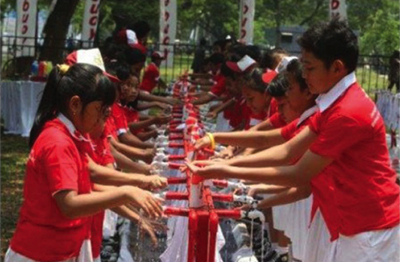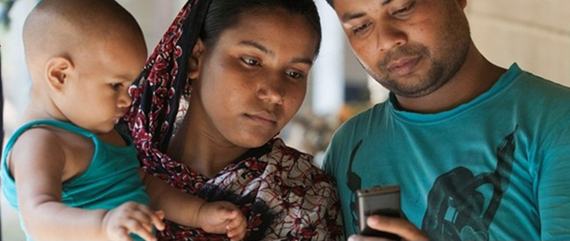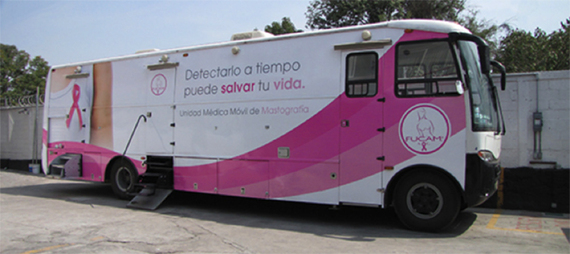Health solutions often exist in the Global South, but the information doesn't get through to marginalized communities because it isn't transmitted in effective or culture-appropriate ways. To close the message gap, practitioners have devised life-saving solutions that range from bumper stickers and text messages to mobile cancer screenings. Read on to learn more about techniques for the dissemination of health information in Mumbai, Mexico City, Nairobi, Jakarta, Dhaka, and Lagos, then join us on URB.im to share your thoughts.
Men who have sex with men are exponentially more likely to be infected with HIV than the general population, but homosexuality being illegal in Kenya, stigma and ignorance make it hard to provide adequate health information and services. Starting in 1997, Ishtar has been offering consultation and outreach to gay men in Nairobi. Through a combination of SMS messaging, peer education, and outreach activity in nightclubs, it aims to inform men about health-related issues and advises them to visit voluntary counseling and testing centers.
In Mexico City, the civil association FUCAM aims to promote early detection education of breast cancer, emphasizing outreach to marginalized socio-economic groups. It performs mammograms in mobile units stationed near places of work and homes in low-income areas. The program helps detect breast cancer at an early stage, create awareness about the importance of the disease, and emphasize the benefits of detecting it early. Funded in part by the federal government, the initiative was able to show that it is possible to diagnose breast cancer cases in early stages in 75 percent of cases, thereby saving women from an all-too-common malignant tumor.
In Mumbai, the government has made tuberculosis treatments available for free, but the illness continues to affect the city's poor - it needs to be accompanied by a comprehensive awareness campaign that targets not only the public, but care providers as well. The most widely known public campaign against TB are the bumper stickers plastered across thousands of rickshaws, declaring "Don't Spit! Spitting spreads TB!" However, the discovery of TB cases starts with making pharmacists more aware of the symptoms, detection processes, and free treatment options. In a groundbreaking public-private partnership program launched in 2008, Mumbai chemists are trained in detecting TB cases and referring patients to local clinics. This initiative has been so successful that it is now being elevated to the national level.
 In Jakarta, the Ministry of Health launched the "Clean and Healthy Living" online campaign, while the private sector launched two initiatives -the "1000 Hygienic Toilets" and "21 Handwashing Days" to encourage hygiene and cleanliness habits in schools. Another important dissemination strategy is to empower existing local community health centers to reach out to the urban poor -- for example, through movie screenings followed by a dialogue on effective health and hygiene practices.
In Jakarta, the Ministry of Health launched the "Clean and Healthy Living" online campaign, while the private sector launched two initiatives -the "1000 Hygienic Toilets" and "21 Handwashing Days" to encourage hygiene and cleanliness habits in schools. Another important dissemination strategy is to empower existing local community health centers to reach out to the urban poor -- for example, through movie screenings followed by a dialogue on effective health and hygiene practices.
In an effort to increase knowledge about health care in Lagos, the state government's approach is to segment the market, focusing awareness efforts on each of the prominent ailments and targeting groups with relevant information. One of these campaigns is the Eko Free Malaria Program, a free health initiative that disseminates free malaria drugs, information on treatment options and on preventative measures in local communities, schools, and facilities. Another example is the state's breast cancer awareness program, which propagates information through educational lectures and grassroots mobilization efforts. The program includes referrals to hospitals for screenings, wellness talks, and aggressive television and radio campaigns on cancer in relevant dialects and languages.
 Dhaka's Aponjon mobile health service is the first-ever nationwide mobile health service in South Asia. It disseminates maternal and child health care information through pre-programmed mobile texting and voicemail services to expectant and new mothers and their guardians. Subscribers receive one to two contextual messages a week related to their pregnancy stage and childbirth until the child is one year old. The information ranges from the importance of direct eye contact between a child and the mother while interacting, to the importance of exclusive breast-feeding in the first six months of the child's life. Subsidies keep the program very affordable, and it already has 40,000 subscribers.
Dhaka's Aponjon mobile health service is the first-ever nationwide mobile health service in South Asia. It disseminates maternal and child health care information through pre-programmed mobile texting and voicemail services to expectant and new mothers and their guardians. Subscribers receive one to two contextual messages a week related to their pregnancy stage and childbirth until the child is one year old. The information ranges from the importance of direct eye contact between a child and the mother while interacting, to the importance of exclusive breast-feeding in the first six months of the child's life. Subsidies keep the program very affordable, and it already has 40,000 subscribers.
Solutions to fighting malaria, TB and HIV, preventing breast cancer, and promoting hygiene and maternal exist, but in order for them to be effective, they must be visible, accessible, and affordable to the urban poor. Visit URB.im to learn more about disseminating health messages to marginalized communities.
